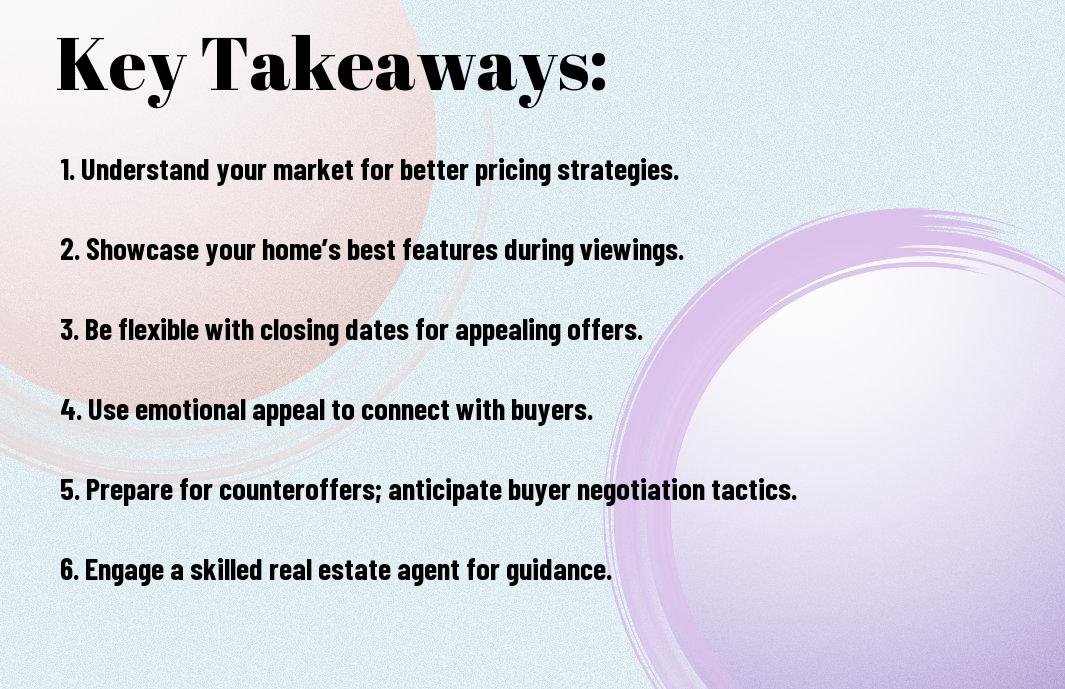With the right negotiation tactics, you can maximize your home sale’s potential and ensure a favorable outcome. Understanding how to navigate negotiations not only empowers you but also can significantly increase your profits. Whether you’re a seasoned seller or initiateing on your first sale, learning the strategies that work will give you the upper hand. For an in-depth look at effective approaches, visit How to Win Your Negotiation As a Home Seller to equip yourself with necessary knowledge and skills.
Key Takeaways:
- Understand your buyer’s motivations to tailor your negotiation strategy effectively.
- Set a clear pricing strategy that includes room for negotiation to improve deal outcomes.
- Be prepared to counter offers and maintain flexibility to create a win-win situation.
Understanding the Real Estate Market
For every successful home seller, having a solid understanding of the real estate market is crucial. The market is not static; it shifts based on numerous factors including local economic conditions, interest rates, and buyer demand. By keeping your finger on the pulse of these dynamics, you can position your home more effectively within the marketplace, maximizing your chances for a positive outcome in the sale process.
Current Market Trends
Behind the scenes of any real estate transaction are the current market trends that dictate buyer behavior. For instance, you may observe rising home prices in your area, which could indicate a seller’s market where demand outweighs supply. Understanding these trends will not only help you determine the best time to list your home but also enlighten you on potentially attractive pricing strategies that reflect the current landscape.
Importance of Pricing Strategies
On the flip side, pricing your home appropriately is an art that goes beyond mere numbers. A well-thought-out pricing strategy takes into account the unique features of your home, its location, and comparisons with recently sold properties in your neighborhood. When you set a competitive price, you attract more potential buyers and encourage stronger offers. Conversely, pricing too high may scare off interested buyers and prolong your home’s time on the market, potentially leading to price reductions down the line.
Hence, adopting a meticulous approach to pricing is equally as important as understanding market trends. You should consider employing a professional appraisal or a trusted real estate agent who can provide insights on comparable sales and current market demand. Balancing the emotional value of your home with factual market data ensures that your pricing strategy aligns with both your goals and potential buyers’ expectations, leading to a smoother negotiation process.
Preparing for Negotiation
It is crucial to come into a negotiation prepared and focused, as this will significantly impact your ability to achieve the best deal for your home. Taking the time to prepare can help you feel more confident and in control, ultimately leading to a more favorable outcome. Understanding what you want out of the negotiation process and being fully equipped with relevant information will position you effectively in discussions with potential buyers. Instead of leaving decisions to chance, structured preparation allows you to steer negotiations in the direction that aligns with your goals.
Setting Clear Goals
One of the first steps in preparing for negotiation is to set clear goals for yourself as a home seller. You need to identify what you aim to achieve from the sale, whether it’s securing a certain price, a quick closing date, or specific terms related to contingencies. By defining these objectives, you can maintain focus and prioritize your needs throughout the negotiation process. Furthermore, articulate your minimum acceptable price, so you know when to stand firm and when to negotiate based on buyer interest.
Gathering Key Information
Between understanding your goals and the market landscape, gathering key information is paramount to your negotiation strategy. Research comparable properties in your area to gauge current market values. Look into recent sales, days on the market, and any special features that may add to your home’s worth. You should also gather data on local market trends, buyer demand, and any economic factors affecting real estate in your region. This comprehensive knowledge will not only arm you with persuasive arguments when discussing price but also provide insight into how flexible you can be with other terms, such as closing dates or repair requests.
Goals should not just be a reflection of your ideal outcome; they should also take into account the current market dynamics and buyer expectations. Being well-informed on what similar properties have sold for recently can enhance your negotiation position, allowing you to justify your asking price or navigate counteroffers with greater confidence. The more data you compile regarding the real estate market and your specific property, the stronger your ability to negotiate effectively will be. This strategic approach not only demonstrates your commitment but also positions you as a knowledgeable seller, which can significantly influence buyer perceptions and negotiations.
Effective Communication Techniques
All successful negotiations hinge on effective communication. This includes not just conveying your thoughts and intentions clearly but also being able to listen actively to the other party. You need to understand the buyer’s perspective, motivations, and concerns. Good communication is a two-way street, and fostering an environment where open dialogue can thrive is imperative. Ensuring both sides feel heard can pave the way for smoother negotiations and help build rapport with potential buyers.
Listening Skills
After you enter negotiations, honing your listening skills becomes imperative. This means paying attention not just to the words being said, but also to the underlying emotions and cues presented by the buyer. You should encourage open dialogue by asking clarifying questions, which not only shows your interest but can also reveal more about what the buyer truly values. By effectively engaging in active listening, you can better tailor your negotiation strategy to fit the needs and wants of the buyer.
Articulating Value
With your listening skills sharp, the next step is to articulate the value of your home effectively. It’s not just about listing features; you should highlight the benefits they bring to potential buyers. For instance, if your home is near quality schools or vibrant local attractions, convey how these elements can enhance the buyers’ lifestyle. Framing your home in terms of its value can create an emotional connection, making it more appealing and increasing the likelihood of a successful negotiation.
Due to the competitive nature of real estate, being able to clearly articulate the unique value of your property can set you apart from other listings. Emphasizing what makes your home special, whether it’s its design, location, or updates you’ve made, can resonate with buyers on a deeper level. The more effectively you communicate these points, the more compelling your negotiating position becomes, allowing you to create a sense of urgency and desirability around your home.
Strategies for Counteroffers
Many home sellers often find themselves negotiating with potential buyers, which includes evaluating and responding to counteroffers. Understanding how to navigate these discussions is key to achieving your desired outcome. As you engage in this process, it can be beneficial to familiarize yourself with Real Estate Negotiation Principles for Buyers & Sellers, as these guidelines can significantly enhance your strategy during negotiations.
Knowing When to Stand Firm
Above all, there are moments in the negotiation process where standing your ground can yield positive results. This is particularly true if you’ve conducted a thorough analysis of your property’s value and have received an offer that doesn’t meet your expectations. If the terms are unreasonably low or the contingencies overly extensive, it may be wise to communicate your stance clearly. Establishing clear boundaries can show buyers that you value your property and can encourage them to reassess their offer.
Flexibility in Negotiation
Behind every successful negotiation is a balance between firmness and flexibility. While it’s vital to maintain your position on important aspects, being open to concessions can facilitate a smoother negotiation process. If a buyer expresses genuine interest, considering adjustments such as minor repairs or closing costs might help bridge the gap. This approach demonstrates that you are approachable and willing to make reasonable compromises, which can create goodwill and potentially lead to a favorable deal.
But flexibility doesn’t mean you have to compromise your bottom line drastically. Instead, you should identify areas where you can afford to be more accommodating without undermining your goals. For instance, if you’re willing to negotiate the closing date or include certain appliances with the sale, you may find that these small gestures can lead to a more favorable offer overall. Evaluating your priorities can help you navigate these negotiations effectively, ensuring you achieve the best possible outcome while promoting a collaborative atmosphere with potential buyers.
Leveraging Professional Help
To navigate the complexities of selling your home, enlisting professional help can elevate your negotiation efforts and maximize your success. This includes leveraging the expertise of real estate agents and legal advisors, who can provide valuable insights and tools tailored to your specific situation. By tapping into their experience, you can enter negotiations with confidence, knowing that you have the right support by your side.
Role of Real Estate Agents
After you decide to sell your home, partnering with a knowledgeable real estate agent can significantly impact your negotiation strategy. These professionals have a deep understanding of local market dynamics, which allows them to accurately price your property and identify potential buyers. A skilled agent can present your home’s best features, manage viewings, and handle all communications, which keeps your negotiation position strong while relieving you of much of the stress involved in the process.
Utilizing Legal Advisors
Against the backdrop of real estate transactions, enlisting legal advisors is a wise choice to safeguard your interests during the negotiation process. These experts can help draft and review contracts, ensuring that terms are favorable to you and compliant with local laws. Their insight can also protect you from potential legal pitfalls that might arise during closing, providing peace of mind as you finalize the sale.
Further, having a legal advisor in your corner means you can approach negotiations with a clear understanding of your rights and obligations. They can help you analyze offers and counteroffers critically, ensuring that you don’t inadvertently agree to terms that could compromise your financial goals. With a legal advisor by your side, you enhance your ability to navigate the negotiations seamlessly and effectively while prioritizing your best interests.
Closing the Deal
Keep in mind that closing the deal is often where the real challenges arise in the selling process. Successfully sealing the agreement means being prepared for additional negotiations and potential last-minute demands. Utilize every tool available to you, including insights from 19 Clever Real Estate Negotiation Strategies From the Pros. This article can illuminate strategies that may help you navigate complex conversations that arise just before the contract is signed. Emphasizing your willingness to negotiate can significantly enhance your position as a seller and enable you to transfer some of the burden onto the buyer, creating a more favorable outcome for you.
Final Negotiation Points
Before wrapping up the deal, focus on final negotiation points such as contingencies, closing costs, and possession dates. Each of these elements can be tweaked slightly to make the deal more appealing to the buyer while still satisfying your own requirements. For instance, if a buyer is hesitant due to closing costs, consider offering to cover a portion of these expenses in exchange for a quicker closing. Small adjustments can foster goodwill and encourage the buyer to finalize the agreement more swiftly.
Understanding Contracts
Around the time you’re finalizing your negotiations, familiarize yourself with the contract involved in the sale of your home. This document is not just a simple agreement; it’s a legal binding between you and the buyer. Take time to understand every clause, especially those that pertain to obligations, timelines, and contingencies. Consider hiring a real estate attorney or a trusted agent to help you review the contract if you’re unsure about some aspects. Being clear on what you’re signing can save you from future disputes and misunderstandings.
Further, understanding contracts means recognizing the importance of deadlines and specific terms. Look out for contingencies that allow buyers to withdraw from the deal should their financing fall through or if a home inspection uncovers serious issues. Ensuring that all agreed-upon terms are clearly documented can protect your interests and lead to a smoother closing process. Knowledge in this area will empower you to negotiate confidently while ensuring you meet your obligations throughout the selling transaction.
To Wrap Up
From above, it’s evident that understanding negotiation tactics can significantly impact the sale of your home. By utilizing strategies such as setting your asking price wisely, being flexible with terms, and preparing to negotiate on repairs or contingencies, you can position yourself favorably in the marketplace. Additionally, knowing when to be firm and when to compromise will enhance your ability to reach a deal that satisfies both you and the buyer.
Incorporating these tactics into your selling strategy enables you to navigate the negotiation process with confidence and authority. As you initiate on your home selling journey, equipping yourself with these effective negotiation tactics not only empowers you but also protects your interests and maximizes your returns. Stay informed, be proactive, and embrace the negotiation process with a positive mindset for a successful home sale.
Q: What are some key negotiation tactics that home sellers can use to maximize their sale price?
A: Home sellers can employ several effective negotiation tactics to enhance their sale price. First, setting a competitive yet appealing listing price can draw more interest and create a sense of urgency among potential buyers. Additionally, being aware of market trends and buyer behavior allows sellers to negotiate from a position of strength. Building rapport with prospective buyers can also pave the way for smoother negotiations. Lastly, having an experienced real estate agent by your side can provide valuable insights and strategies tailored to your specific situation, ensuring you achieve the best possible outcome.
Q: How can a seller use staging to their advantage during negotiations?
A: Staging a home can significantly impact negotiations by showcasing the property’s best features and creating an emotional connection for potential buyers. By decluttering, rearranging furniture, and adding tasteful décor, sellers can enhance the overall appeal of their home. This visual presentation can lead to higher offers, as buyers are often willing to pay more for a move-in-ready property. Furthermore, staged homes tend to sell faster, which can be leveraged during negotiations to emphasize demand and drive multiple offers, thus increasing the seller’s bargaining power.
Q: What strategies should sellers employ to handle lowball offers during negotiations?
A: When faced with lowball offers, sellers should approach the situation with an open mind and a strategic perspective. Instead of reacting defensively, it’s beneficial to evaluate the offer objectively and consider whether any terms of the contract may be appealing. In cases of significantly low offers, responding with a counteroffer that reflects the home’s true value is effective. Including a detailed market analysis can strengthen the counteroffer and provide buyers with a clearer understanding of the home’s worth. Additionally, maintaining open lines of communication can lead to productive discussions and foster the possibility of finding common ground.







